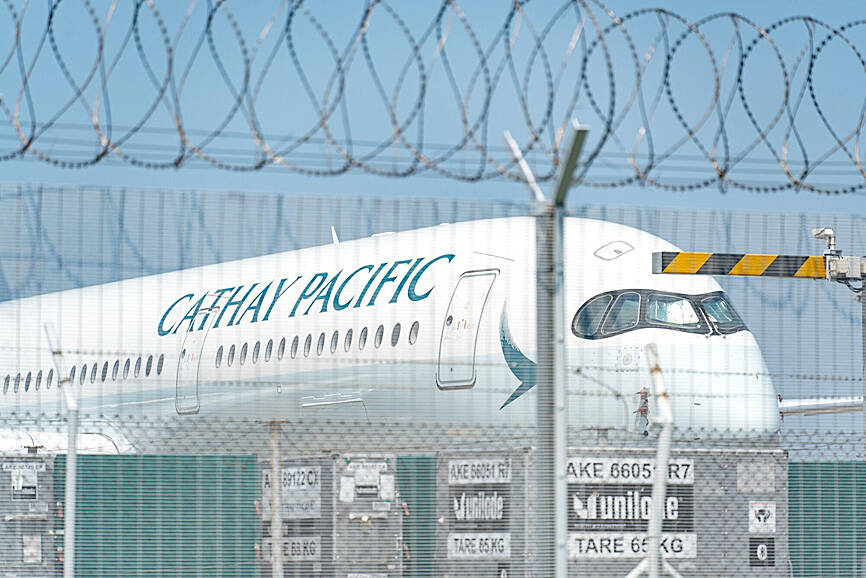Hong Kong carrier Cathay Pacific Airways Ltd (國泰航空) yesterday said that it would buy at least 30 Airbus SE A330-900 aircraft in a deal valued at US$11 billion as it looks to build on a post-COVID-19 recovery and reach pre-pandemic passenger numbers next year.
The firm made the announcement as it reported a drop in profit in the first half of the year, having moved into the black for the first time in four years last year thanks to a pickup in post-pandemic demand.
Cathay did not disclose the total price of the planes, but said it had received “significant price concessions” on the basic value of approximately HK$85.8 billion (US$11 billion) from the European company.

Photo: Bloomberg
The new planes are expected to be delivered by the end of 2031.
Cathay said it has also “secured the right to acquire 30 additional Airbus A330-900 aircraft.”
The airline said it already had a fleet of more than 230 mostly passenger aircraft.
“The aircraft will progressively replace the company’s existing fleet of mid-size widebody aircraft and enable future growth,” Cathay said in a statement.
The airline’s passenger count has reached 80 percent of its pre-pandemic levels and it hopes to hit 100 percent early next year, it said.
Cathay had earlier vowed to return to 100 percent pre-pandemic passenger flight levels by the end of this year, but in March pushed back the target by up to three months.
The airline is in the process of recruiting and training “that is driving our rebuild and the addition of more flights and destinations for our customers to cater for the strong demand for travel,” it said.
Cathay said profit attributable to shareholders slipped 15 percent year-on-year to US$463 million in the first half, adding that costs had increased from operating more flights.
However, total revenue in the period increased nearly 14 percent to US$6.4 billion, driven by the pickup in travel demand and a strong cargo business, it said.
The airline proposed paying a first interim dividend of HK$0.20 per share to ordinary shareholders in two months’ time, it added.

Taiwan Semiconductor Manufacturing Co (TSMC, 台積電) secured a record 70.2 percent share of the global foundry business in the second quarter, up from 67.6 percent the previous quarter, and continued widening its lead over second-placed Samsung Electronics Co, TrendForce Corp (集邦科技) said on Monday. TSMC posted US$30.24 billion in sales in the April-to-June period, up 18.5 percent from the previous quarter, driven by major smartphone customers entering their ramp-up cycle and robust demand for artificial intelligence chips, laptops and PCs, which boosted wafer shipments and average selling prices, TrendForce said in a report. Samsung’s sales also grew in the second quarter, up

On Tuesday, US President Donald Trump weighed in on a pressing national issue: The rebranding of a restaurant chain. Last week, Cracker Barrel, a Tennessee company whose nationwide locations lean heavily on a cozy, old-timey aesthetic — “rocking chairs on the porch, a warm fire in the hearth, peg games on the table” — announced it was updating its logo. Uncle Herschel, the man who once appeared next to the letters with a barrel, was gone. It sparked ire on the right, with Donald Trump Jr leading a charge against the rebranding: “WTF is wrong with Cracker Barrel?!” Later, Trump Sr weighed

HEADWINDS: Upfront investment is unavoidable in the merger, but cost savings would materialize over time, TS Financial Holding Co president Welch Lin said TS Financial Holding Co (台新新光金控) said it would take about two years before the benefits of its merger with Shin Kong Financial Holding Co (新光金控) become evident, as the group prioritizes the consolidation of its major subsidiaries. “The group’s priority is to complete the consolidation of different subsidiaries,” Welch Lin (林維俊), president of the nation’s fourth-largest financial conglomerate by assets, told reporters during its first earnings briefing since the merger took effect on July 24. The asset management units are scheduled to merge in November, followed by life insurance in January next year and securities operations in April, Lin said. Banking integration,

LOOPHOLES: The move is to end a break that was aiding foreign producers without any similar benefit for US manufacturers, the US Department of Commerce said US President Donald Trump’s administration would make it harder for Samsung Electronics Co and SK Hynix Inc to ship critical equipment to their chipmaking operations in China, dealing a potential blow to the companies’ production in the world’s largest semiconductor market. The US Department of Commerce in a notice published on Friday said that it was revoking waivers for Samsung and SK Hynix to use US technologies in their Chinese operations. The companies had been operating in China under regulations that allow them to import chipmaking equipment without applying for a new license each time. The move would revise what is known